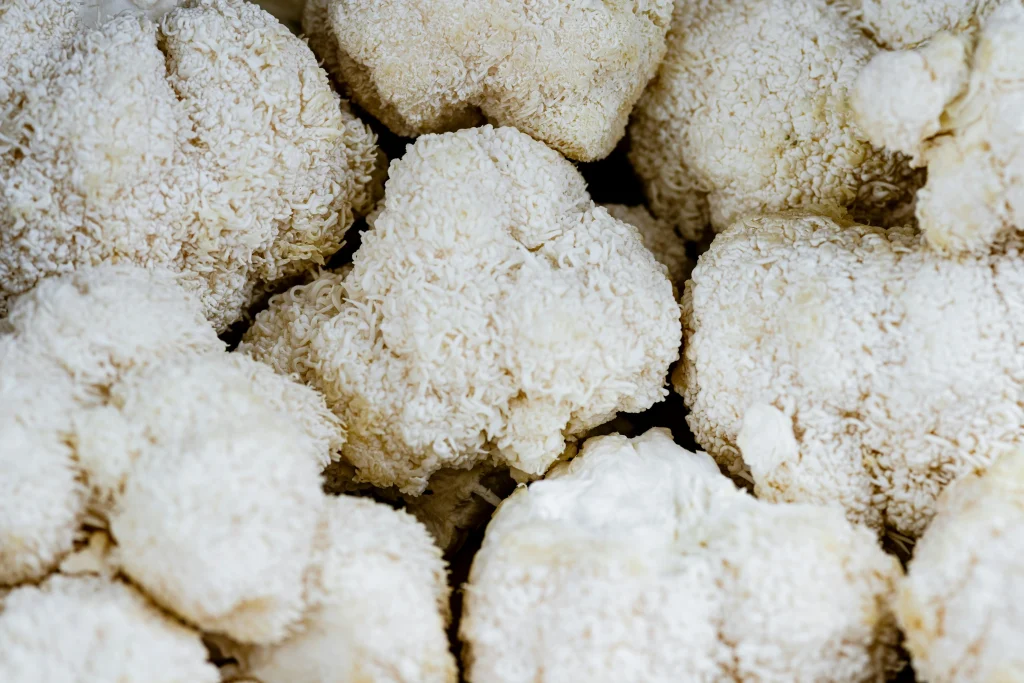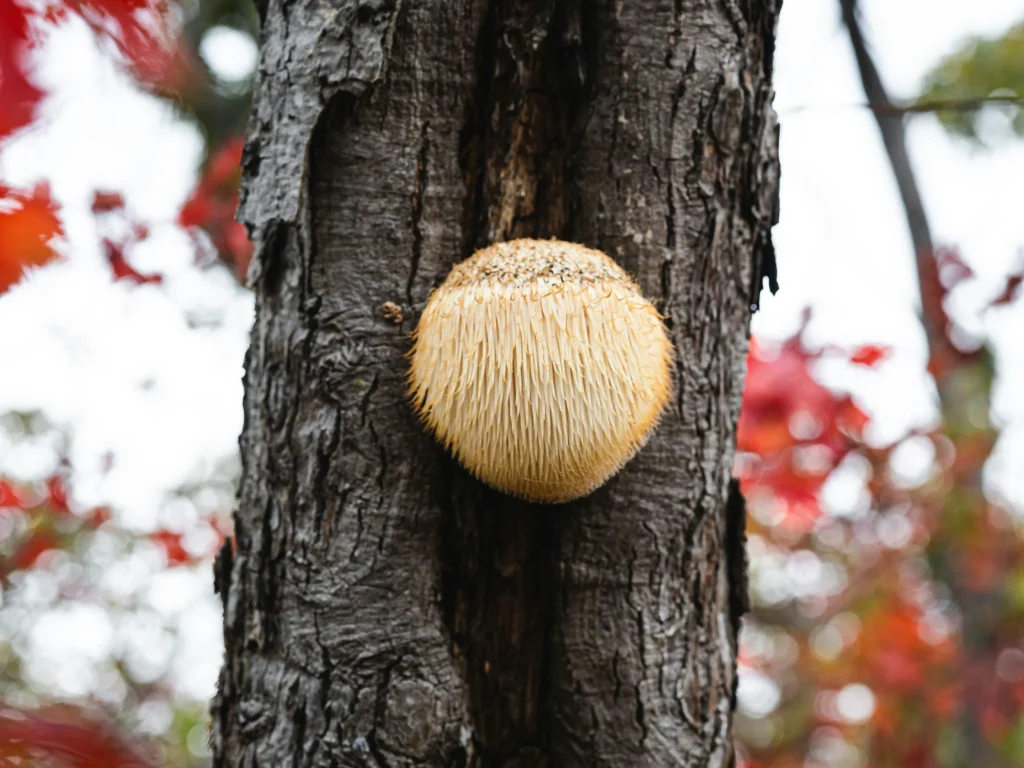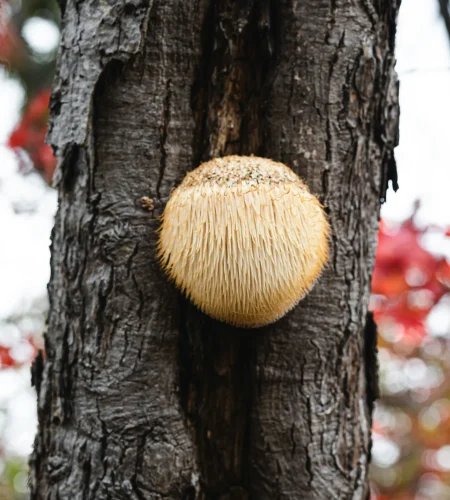Lion’s mane mushrooms, with their striking appearance and remarkable health benefits, have captured the attention of mushroom enthusiasts and health-conscious individuals alike. These unique fungi, native to North America, Asia, and Europe, are gaining popularity in Florida for their culinary versatility and potential therapeutic properties. In this comprehensive guide, we’ll explore the world of lion’s mane mushrooms, including their cultivation, culinary applications, and the numerous benefits they offer. Whether you’re a mushroom connoisseur or simply curious about these fascinating fungi, this article will provide you with valuable insights and inspiration to incorporate these marvels of nature into your diet and lifestyle.
What are Lion’s Mane Mushrooms?
Lion’s mane mushrooms (Hericium erinaceus) are a type of edible fungus known for their distinctive appearance. These mushrooms feature a cascading, shaggy cap resembling a lion’s mane, hence their name. They are typically white or cream in color and can grow up to 20 inches in diameter.Lion’s mane mushrooms are prized not only for their unique appearance but also for their delicate, seafood-like flavor and meaty texture. They are often compared to crab or lobster meat, making them a popular choice for vegetarian and vegan dishes.
Where can Lion’s Mane Mushrooms be Found in Florida?
While lion’s mane mushrooms are not native to Florida, their cultivation has become increasingly popular in the state due to the favorable climate and growing demand for these fungi. Here are some of the best spots to find lion’s mane mushrooms in Florida:
- Local Mushroom Farms: Several mushroom farms in Florida, such as Fungi Jon’s Lion’s Mane in Orlando and Sunshine Mushrooms in Gainesville, specialize in cultivating lion’s mane mushrooms using organic practices.
- Farmers’ Markets: Many farmers’ markets across Florida, particularly in central and southern regions, offer locally grown lion’s mane mushrooms from small-scale producers.
- Specialty Grocery Stores: Some specialty grocery stores and health food stores in Florida carry fresh or dried lion’s mane mushrooms, often sourced from local or regional suppliers.
- Online Retailers: If you can’t find lion’s mane mushrooms locally, several online retailers ship fresh or dried mushrooms directly to customers in Florida.
- Grow Your Own: For the adventurous, lion’s mane mushroom grow kits are available for purchase, allowing you to cultivate these fungi at home.
- Foraging: While not common, lion’s mane mushrooms can occasionally be found growing in the wild on dead or dying hardwood trees in Florida’s forests and wooded areas.
Remember, when foraging for wild mushrooms, it’s essential to have proper identification skills and follow local regulations to ensure your safety and the sustainability of the mushroom population.

What are the Health Benefits of Lion’s Mane Mushrooms?
Lion’s mane mushrooms are not only delicious but also offer a range of potential health benefits. Here are some of the most notable advantages associated with these fungi:
- Cognitive Function: Several studies have suggested that lion’s mane mushrooms may improve cognitive function and memory due to their ability to stimulate the production of nerve growth factor (NGF). NGF is a protein that plays a crucial role in the growth, maintenance, and survival of neurons in the brain.
- Anti-Inflammatory Properties: Lion’s mane mushrooms contain compounds that may help reduce inflammation in the body. Chronic inflammation has been linked to various health conditions, including heart disease, cancer, and Alzheimer’s disease.
- Neuroprotective Effects: Research indicates that lion’s mane mushrooms may have neuroprotective properties, potentially helping to prevent or slow the progression of neurodegenerative diseases like Parkinson’s and Alzheimer’s.
- Mental Health Support: Some studies suggest that lion’s mane mushrooms may help alleviate symptoms of depression and anxiety, possibly due to their ability to regulate neurotransmitter levels in the brain.
- Immune System Boost: Lion’s mane mushrooms contain beta-glucan compounds that may enhance the immune system’s ability to fight off infections and diseases.
- Diabetes Management: Preliminary research suggests that lion’s mane mushrooms may help regulate blood sugar levels and improve insulin sensitivity, potentially benefiting individuals with diabetes or at risk of developing the condition.
While these potential benefits are promising, it’s important to note that more research is needed to fully understand the therapeutic effects of lion’s mane mushrooms. As with any supplement or dietary change, it’s always best to consult with a healthcare professional before incorporating lion’s mane mushrooms into your routine.

How to Cook and Enjoy Lion’s Mane Mushrooms
Lion’s mane mushrooms are not only nutritious but also incredibly versatile in the kitchen. Their unique texture and delicate flavor make them a fantastic addition to a variety of dishes. Here are some popular ways to cook and enjoy these fungi:
- Sautéed or Grilled: Lion’s mane mushrooms can be sliced or left whole and sautéed in butter or olive oil until golden brown. They can also be grilled or roasted, which brings out their natural umami flavor.
- Soups and Stews: Add lion’s mane mushrooms to soups, stews, or broths for a delicious and nutritious boost. Their meaty texture and mild flavor pair well with a variety of ingredients.
- Vegan “Crab” Cakes or “Lobster” Rolls: Due to their seafood-like texture, lion’s mane mushrooms make an excellent plant-based alternative to crab or lobster in dishes like vegan crab cakes or lobster rolls.
- Stir-Fries: Incorporate sliced or shredded lion’s mane mushrooms into your favorite stir-fry recipes for added texture and flavor.
- Mushroom Coffee or Tea: Lion’s mane mushroom extract or powder can be added to coffee or tea for a nutritional boost and potential cognitive benefits.
- Supplements: Lion’s mane mushroom supplements, available in capsule or powder form, offer a convenient way to incorporate these fungi into your daily routine.
When cooking with lion’s mane mushrooms, it’s essential to handle them gently to preserve their delicate texture. Additionally, be mindful of their tendency to absorb flavors, so season them accordingly to complement the dish you’re preparing.
Where to Buy Lion’s Mane Mushrooms in Florida
If you’re interested in purchasing lion’s mane mushrooms in Florida, here are some options to consider:
- Local Mushroom Farms: Many mushroom farms in Florida, such as Fungi Jon’s Lion’s Mane in Orlando and Sunshine Mushrooms in Gainesville, offer fresh lion’s mane mushrooms for purchase. Some farms may also provide delivery or shipping options.
- Farmers’ Markets: Check your local farmers’ markets for vendors selling fresh, locally grown lion’s mane mushrooms. These markets often feature a variety of mushroom species from small-scale producers.
- Specialty Grocery Stores: Some specialty grocery stores and health food stores in Florida carry fresh or dried lion’s mane mushrooms. These stores may also offer lion’s mane mushroom supplements or products.
- Online Retailers: If you can’t find lion’s mane mushrooms locally, several online retailers ship fresh or dried mushrooms directly to customers in Florida. Some popular options include Smallhold, Mushroom Revival, and Fungi Perfecti.
- Grow Your Own: For those interested in cultivating their own lion’s mane mushrooms, grow kits are available for purchase from various online retailers or local gardening stores.
When purchasing lion’s mane mushrooms, look for fresh, firm specimens with a white or cream color and no signs of discoloration or decay. If buying dried mushrooms, ensure they are stored in an airtight container and have a pleasant, earthy aroma.
Key Takeaways
- Lion’s mane mushrooms are edible fungi known for their unique appearance, delicate flavor, and potential health benefits.
- These mushrooms can be found at local mushroom farms, farmers’ markets, specialty grocery stores, and online retailers in Florida.
- Lion’s mane mushrooms offer a range of potential benefits, including improved cognitive function, anti-inflammatory properties, neuroprotective effects, and mental health support.
- They are incredibly versatile in the kitchen and can be enjoyed sautéed, grilled, in soups and stews, or as a plant-based alternative to seafood dishes.
- When purchasing lion’s mane mushrooms, look for fresh, firm specimens or high-quality dried mushrooms from reputable sources.
- As with any supplement or dietary change, it’s essential to consult with a healthcare professional before incorporating lion’s mane mushrooms into your routine.
By embracing the marvels of lion’s mane mushrooms, you can not only enjoy their delicious flavor but also potentially reap the numerous health benefits these fungi have to offer. Explore the world of lion’s mane mushrooms and discover the magic of these fascinating fungi.
Share
Rewrite
FAQs
Is it legal to grow lions mane?
Yes, it is legal to grow lion’s mane mushrooms (Hericium erinaceus) in most areas, including Florida. Lion’s mane is an edible fungus that is not regulated or controlled in the same way as certain psychoactive or toxic mushroom species.Growing lion’s mane mushrooms at home or for commercial purposes is generally permitted, as long as you follow any local regulations or guidelines regarding mushroom cultivation and sales. However, it’s always a good idea to check with your local authorities or agricultural extension office to ensure compliance with any specific rules or requirements in your area.
Is it illegal to grow lions mane?
No, it is not illegal to grow lion’s mane mushrooms. Lion’s mane is a safe, edible fungus that does not contain any controlled substances or toxins that would make its cultivation illegal.Unlike certain psychoactive or poisonous mushroom species, which may be subject to legal restrictions or prohibitions, lion’s mane mushrooms are widely recognized as a culinary and medicinal mushroom with no known harmful effects when consumed or grown responsibly.As long as you follow proper cultivation practices and adhere to any relevant local regulations or guidelines, growing lion’s mane mushrooms for personal or commercial use is generally considered a legal and permissible activity.
How does Lion’s Mane make you feel?
Lion’s mane mushrooms are known for their potential cognitive and neurological benefits, which may contribute to an overall sense of mental clarity and well-being. Here are some of the ways lion’s mane can potentially make you feel:
- Improved focus and concentration: Lion’s mane mushrooms contain compounds that may stimulate the production of nerve growth factor (NGF), which supports the growth and maintenance of neurons in the brain. This can potentially lead to improved cognitive function, better concentration, and enhanced mental clarity.
- Reduced anxiety and depression: Some studies suggest that lion’s mane mushrooms may help alleviate symptoms of anxiety and depression, possibly due to their ability to regulate neurotransmitter levels in the brain. This can contribute to a more positive and stable mood.
- Increased energy and vitality: Lion’s mane mushrooms are rich in antioxidants and beneficial compounds that may help reduce inflammation and support overall health. This can potentially lead to increased energy levels and a general sense of vitality.
- Better sleep quality: While more research is needed, some people report improved sleep quality and reduced fatigue after incorporating lion’s mane mushrooms into their diet or supplement routine.
It’s important to note that the effects of lion’s mane mushrooms can vary from person to person, and individual experiences may differ. Additionally, it’s always best to consult with a healthcare professional before incorporating any new supplement or dietary change, especially if you have any underlying health conditions or are taking medications.
Can you eat lion’s mane raw?
While it is technically possible to eat lion’s mane mushrooms raw, it is generally not recommended. Raw lion’s mane mushrooms can be tough and fibrous, making them difficult to chew and digest.Cooking lion’s mane mushrooms is the preferred method for several reasons:
- Improved texture: Cooking helps to break down the tough fibers in lion’s mane mushrooms, resulting in a more tender and palatable texture. Sautéing, grilling, or roasting are popular cooking methods that can enhance the mushroom’s flavor and texture.
- Better digestibility: Cooking can help to break down the chitin (a fibrous substance) in the mushroom’s cell walls, making it easier for your body to digest and absorb the nutrients.
- Enhanced flavor: Cooking brings out the natural umami flavor of lion’s mane mushrooms, adding depth and complexity to the taste.
- Potential health benefits: Some studies suggest that cooking mushrooms may increase the bioavailability of certain beneficial compounds, such as antioxidants and beta-glucans, which can enhance their potential health benefits.
If you do choose to consume lion’s mane mushrooms raw, it’s recommended to slice or shred them thinly to improve their texture and digestibility. Additionally, raw lion’s mane mushrooms can be added to smoothies or juices, where the blending process can help to break down their fibrous structure.However, for the best culinary experience and to maximize the potential health benefits, cooking lion’s mane mushrooms is generally the preferred method.


Comments